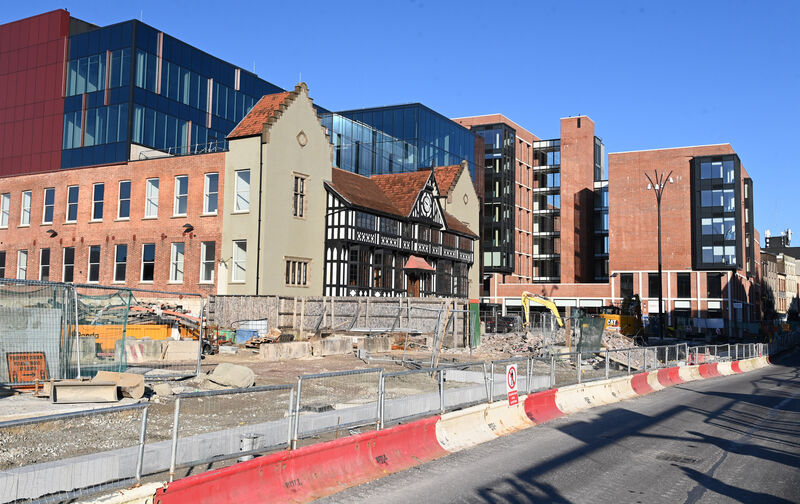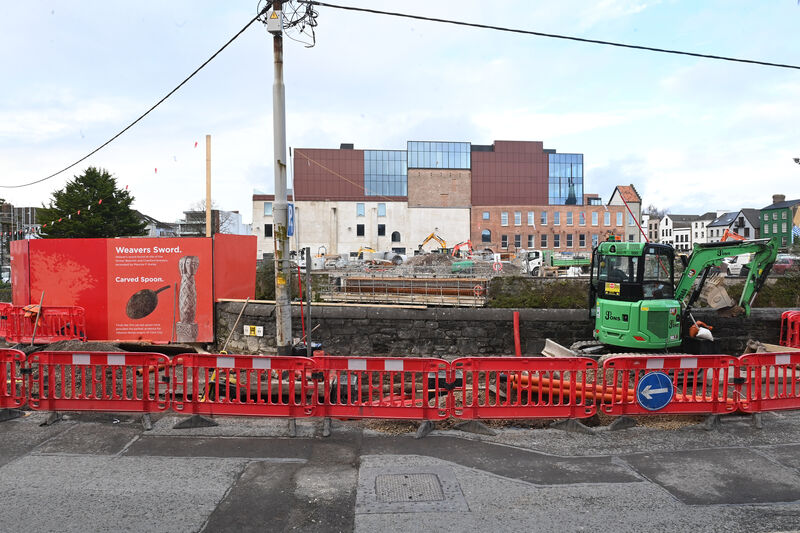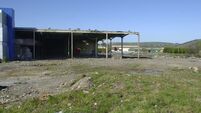Cork event centre developer seeks five-year planning extension as delays continue

Bridges are being installed by Cork City Council as part of a massive public realm upgrades in the area. Bam had to pay substantial development charges towards the cost of the bridges.
Developer Bam has applied for a five-year extension to its event centre planning permission in Cork City, which it says expires in June.
If approved, the extension would give the firm until June 2030 to deliver the permitted 6,000-capacity venue and logistical support offices on its site on South Main St.
A decision on the extension is due in May.
In an 80-page document lodged with Cork City Council, its planning consultants say development started on the site in 2023, with “substantial works” carried out to date, and that by this June, substantial additional works will have been completed and that Bam will have spent just over €6.6m on the project.
It is the latest twist in the long-running and complex saga which saw the sod turned for the venue in 2016, just weeks before a general election but where construction of the venue itself has yet to start.
Following a redesign, detailed design work, and complex funding issues, it was March 11, 2020, before An Bord Pleanála granted planning for the venue.
Planning permission normally expires after five years, but in its request to Cork City Council for an extension, Bam’s planning consultants HW Planning says the planning will not expire until June.
It points out that under a specific section of the Planning and Development Act 2000, an additional 101 days should be included in its “appropriate period”, which means the planning permission will not expire until June 19, 2025.
It says the additional period includes 45 days — nine days per year — over the various Christmas periods, in accordance with Section 251 of the Planning and Development Act 2000, and an additional 56 days arising out of the Covid 19 Act 2020.
That act during the covid public health emergency gave the minister for housing, planning and local government the power to freeze all time-limits in the planning code.

The 56-day freeze began on March 29, 2020, just days after the board granted planning for the event centre, and concluded on May 23, 2020.
In assessing any request for an extension of planning, local authorities have to consider a number of issues, including whether development has started, and whether substantial works must have been carried out since planning was granted.
In the request for an extension, HW Planning says although significant “positive progress has been made towards the full realisation of the scheme”, there were significant delays to the commencement of development due to the funding of the project, as well as delays to construction as a result of the covid 19 pandemic and impact on supply chains as a result of the war in the Ukraine.
The consultants then deal directly with what constitutes "substantial works".
They say each application for an extension of planning should be dealt with on its individual merits and they cite several case law examples dealing with the matter of “substantial works”.
“The term substantial works does not mean substantial in the context of the overall development or a percentage of development but must constitute substantial works in a wider context,” they said.
“Planning case law has clearly indicated that substantial works in the context of section 42 of the planning and development act 2000 does not mean a substantial proportion of the permitted works and this interpretation is accepted among local authorities.”
They also cite one case where “offsite works necessary to deliver development” should be considered by planning authorities as ‘substantial works’.
The request for an extension includes a site plan prepared by architects Scott Tallon Walker which HW Planning says shows that considerable progress has been made on the delivery of the project since planning was granted. They say that by June, the following works will have been carried out:
- Utility connection works for water, telecommunications and electricity;
- Site enabling works associated with the refurbishment of the city wall and the installation of pedestrian bridges;
- The off-site construction of the bridges;
- The installation of one of the bridges, which will connect Crosses Green to the event centre site.
The bridges are being installed by Cork City Council as part of a massive public realm upgrades in the area.
Bam had to pay substantial development charges towards the cost of the bridges.
The consultants say Bam has incurred expenditure of some €6.635m relating to the construction of the development when public realm upgrades, bridge installation and key wall works as permitted would be completed.
“Having regard to the extent of development completed today and caselaw we believe that these works could only be considered to be substantial,” they say.
It comes as work continues on the new tendering process, ordered by government last October, for what is believed will be a substantially increased state aid package designed to secure the delivery of an event centre for Cork.
The retendering is expected to take between 12-18 months to complete.
It is being overseen by a seven-person development board but details on the new tendering criteria, including whether or not applicants need a site or planning, have yet to be released.

Bam was asked to comment on its application and in a statement said: “Bam remains committed to delivering a world-class events centre for Cork. We will consider the detail of the procurement process when it commences.”
Bam won a tender in 2014 for some €20m in State aid for its proposed venue on South Main St, with Live Nation lined up to operate it.
But the cost of the delivering the venue, which has since been redesigned, has soared over the years from an initial estimate of around €50m to around €150m today.
The amount of available state aid has also soared, from €20m to the €57m pledged shortly after covid.
But as building costs soared, Government was told that an additional €30m to €40m in State aid would be required.
Concerns about the scale of change in the funding model and state aid rules prompted legal advice to Cabinet which led to last October’s decision to order a new tendering process.
The Marina Market, which is designing a venue for its south docklands site, is awaiting details on the procurement process which will determine whether or not it qualifies to get involved in the new tendering process.









